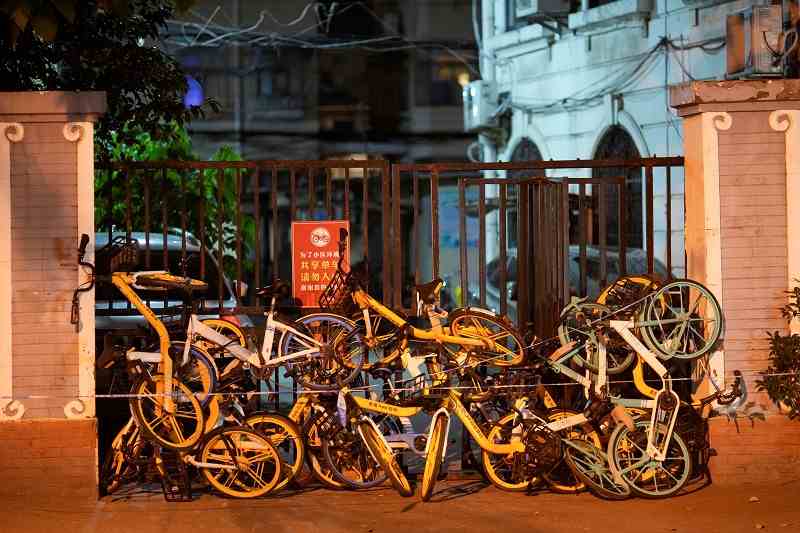
A gate blocks the entrance to a residential area during lockdown, amid the coronavirus disease (COVID-19) pandemic, in Shanghai, China, May 10, 2022.
11:26 JST, May 11, 2022
LONDON (Reuters) – The head of the World Health Organization said on Tuesday China’s zero-tolerance COVID-19 policy is not sustainable given what is now known of the virus, in rare public comments by the U.N. agency on a government’s handling of the pandemic.
“We don’t think that it is sustainable considering the behavior of the virus and what we now anticipate in the future,” WHO Director-General Tedros Adhanom Ghebreyesus told a media briefing.
“We have discussed this issue with Chinese experts. And we indicated that the approach will not be sustainable… I think a shift would be very important.”
He said increased knowledge about the virus and better tools to combat it also suggested it was time for a change of strategy.
The comments come after China’s leaders have repeated their resolve to battle the virus with tough measures and threatened action against critics at home even as strict and prolonged lockdowns exact a heavy toll on the world’s second-largest economy.
Speaking after Tedros, WHO emergencies director Mike Ryan said the impact of a “zero-COVID” policy on human rights also needs to be taken into consideration.
“We have always said as WHO that we need to balance the control measures against the impact they have on society, the impact they have on the economy, and that’s not always an easy calibration,” said Ryan.
He also noted that China has registered 15,000 deaths since the virus first emerged in the city of Wuhan in late 2019 – a relatively low number compared with nearly 1 million in the United States, more than 664,000 in Brazil and over 524,000 in India.
With that in mind, it is understandable, Ryan said, that the world’s most populous country would want to take tough measures to curb coronavirus contagion.
Still, China’s zero-COVID policy has drawn criticism ranging from scientists to its own citizens, leading to a cycle of lockdowns of many millions of people, anguish and anger. Most other nations that shared its approach initially have now at least begun a transition to strategies to live with the virus.
The continued outbreaks also underscore how difficult it is to stop the spread of the highly transmissible Omicron variant.
Under zero-COVID, authorities lock down large population areas to stamp out viral spread in response to any coronavirus outbreak, even if just a small number of people test positive.
Shanghai’s measures have been particularly strict, with residents allowed out of compounds only for exceptional reasons, such as a medical emergency. Many are not even allowed out of their front doors to mingle with neighbors.
Its quarantine policy has also been criticized for separating children from parents and putting asymptomatic cases among those with symptoms.
Highlighting the far-reaching impact of prolonged lockdowns on global manufacturing and supplies of critical goods, General Electric’s healthcare unit outlined on Tuesday the drastic measures it has taken to deal with shortages of dye used for medical scans and tests in the United States caused by the suspension of its Shanghai factory.
Top Articles in News Services
-

Prudential Life Expected to Face Inspection over Fraud
-

Hong Kong Ex-Publisher Jimmy Lai’s Sentence Raises International Outcry as China Defends It
-

Japan’s Nikkei Stock Average Touches 58,000 as Yen, Jgbs Rally on Election Fallout (UPDATE 1)
-

Trump Names Former Federal Reserve Governor Warsh as the Next Fed Chair, Replacing Powell
-

Suzuki Overtakes Nissan as Japan’s Third‑Largest Automaker in 2025
JN ACCESS RANKING
-

Japan Institute to Use Domestic Commercial Optical Lattice Clock to Set Japan Standard Time
-

Israeli Ambassador to Japan Speaks about Japan’s Role in the Reconstruction of Gaza
-

Man Infected with Measles May Have Come in Contact with Many People in Tokyo, Went to Store, Restaurant Around When Symptoms Emerged
-

Prudential Life Insurance Plans to Fully Compensate for Damages Caused by Fraudulent Actions Without Waiting for Third-Party Committee Review
-

Woman with Measles Visited Hospital in Tokyo Multiple Times Before Being Diagnosed with Disease





















